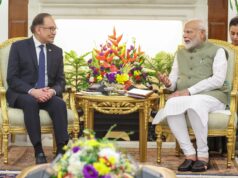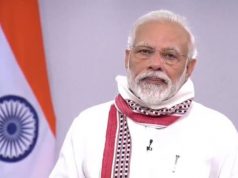New Delhi (dpa) – India and Japan signed agreements deepening defence ties and a preliminary accord on civil nuclear energy during an annual summit of their prime ministers in New Delhi.
Japan also committed funds and technology to Indian Prime Minister Narendra Modi’s pet bullet train project.
The summit was “historic” and would take India-Japan relations to a new level, Japanese Prime Minister Shinzo Abe said during a joint press briefing with Modi.


The two sides also put out a joint statement titled India and Japan Vision 2025 setting out their aims for a long-term, broad-based and strategic partnership.
Among the agreements signed during Abe’s three-day visit to India was one according to which Japan would provide 12 billion dollars in a soft loan and technical assistance for a bullet train project between the Indian commercial centres of Mumbai and Ahmedabad.
“This enterprise will launch a revolution in Indian railways and speed up India’s journey into the future,” Prime Minister Narendra Modi said at a joint press briefing with his Japanese counterpart Shinzo Abe.
Modi said no country had contributed as much as Japan had to India’s economic transformation through supporting key infrastructure projects at critical junctures.
Both leaders at the press briefing stressed the deepening of strategic and defence ties through the defence agreements and greater cooperation in maritime defence exercises in the Asia-Pacific region along with the United States and with Australia.
Experts see this as an aim to contain China in these strategic waters. “Disputes must be resolved peacefully and all countries must abide by international law and maritime protocols,” Modi said.
One of the defence-related pacts was on the transfer of defence equipment and technology and the other on security measures for the exchange of classified military information.
A memorandum of understanding on cooperation on peaceful uses of nuclear energy had been finalised and would be inked after some technical details were worked out, the joint statement said.
“I expect that India will act responsibly on the use of nuclear energy for peaceful purposes and work together with us to create a world free of nuclear weapons,” Abe added after saying the deal was in its final stages.
India said it would begin offering visas on arrival to Japanese nationals from March 1, while Japan said it would offer multiple-entry visas to Indians.
Modi and Abe met earlier with prominent business leaders of both countries.
Modi is scheduled to escort Abe on a visit to the ancient Hindu temple town Varanasi, his constituency, later Saturday.
Japan and India have close ties and Modi chose Japan as his first destination for a visit abroad after becoming prime minister in May 2014.










